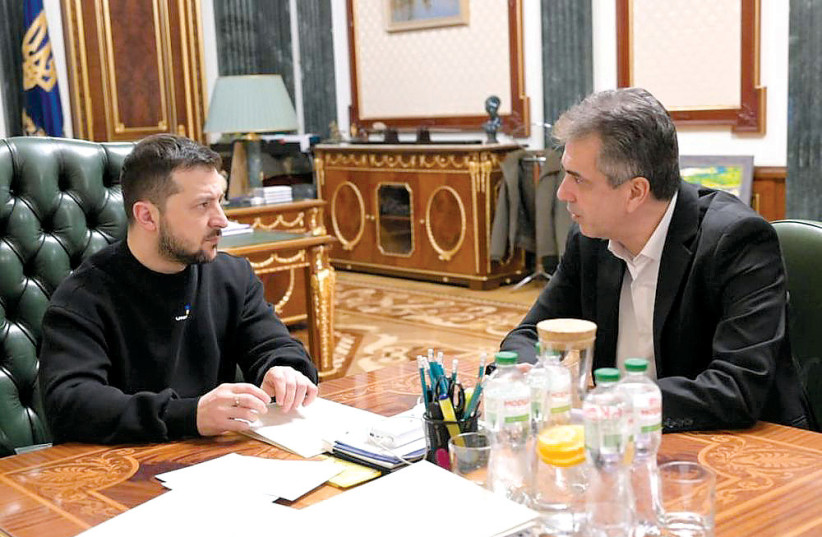TERROR TRAGEDIES
In a terrorist car ramming at a bus stop in Jerusalem’s Ramot neighborhood on February 10, Yaakov Yisrael Paley, 6, his brother Asher Menachem Paley, 8, and Alter Shalom Lederman, 20, a newly wed rabbinical student, were murdered. The terrorist, Hussein Karaka, 31, was shot dead at the scene by an off-duty policeman. On February 13, a 13-year-old Palestinian stabbed Border Police officer Asil Sawaed, 20, at a checkpoint from the Shuafat refugee camp. A security guard shot at the terrorist, who was later arrested, accidentally hitting Sawaed, who died of his wounds.
SETTLEMENTS LEGALIZED
Israel’s cabinet on February 12 authorized nine Jewish settlements in the West Bank that were previously unauthorized outposts, and also approved the construction of 10,000 new homes in settlements, drawing international condemnation. US Secretary of State Antony Blinken said he was “deeply troubled” by Israel’s decision. “Like previous administrations, Democratic and Republican, we strongly oppose such unilateral measures, which exacerbate tensions and undermine the prospects for a negotiated two-state solution,” Blinken said. In response, a senior Israeli official said the difference of opinion over settlements “would not harm the strong alliance between Israel and the US.”
HERZOG’S APPEAL
In an unusual primetime address on February 12, President Isaac Herzog called for a halt to the legislative process to allow the coalition and the opposition to negotiate a compromise to the government’s legal reforms based on a broad consensus. He presented a five-point plan, which included changing the way judges are selected and strengthening the country’s Basic Laws. The next day, Justice Minister Yariv Levin (Likud) and Knesset Constitution, Law and Justice Committee chairman Simcha Rothman (Religious Zionist Party) reached out to opposition leader Yair Lapid (Yesh Atid) and National Unity chair Benny Gantz to launch a dialogue at the President’s Residence, but the latter insisted they would only do so only if the legislative process to pass the reforms was suspended in the Knesset.
OLIVE BRANCH
In an operation dubbed Olive Branch, Israel dispatched search and rescue teams to Turkey following the devastating earthquakes that struck on February 6. The IDF sent 15 aircraft with hundreds of tons of medical and other supplies, along with a 150-member rescue team and a 230-person medical field hospital team. The team rescued some 19 Turkish citizens from the rubble under harsh weather conditions, while more than 300 patients were treated in the IDF field hospital. Among the tens of thousands of casualties were Saul Cenudioglu, head of the Antakya Jewish community in Turkey, and his wife, Fortuna. IDF National Rescue Unit head Col. (Res.) Golan Vach noted that it was the unit’s 31st mission in four decades. “We feel a great privilege to reach out to our neighbors,” he said.
SYRIA STRIKE
The Syrian Observatory for Human Rights reported that the Israeli Air Force carried out a strike on the Kafr Sousa neighborhood in Damascus late on February 18, killing up to 15 people and wounding 15 others. The IDF declined to comment. Reuters quoted Western intelligence sources as saying the target was a logistics center in a building run by Iran’s Islamic Revolutionary Guard Corps (IRGC).
AFRICAN BREACH
An Israeli observer delegation led by Foreign Ministry Deputy Director General for Africa Sharon Bar-Li was kicked out of the opening ceremony of the African Union summit in Addis Ababa on February 18, the Foreign Ministry said, blaming South Africa and Algeria for the diplomatic breach. “It is sad to see that the African Union has been taken hostage by a small number of extremist countries such as Algeria and South Africa, driven by hatred and controlled by Iran,” said Foreign Ministry spokesperson Lior Hayat.

UKRAINE VISIT
In mid-February, Foreign Minister Eli Cohen became the first Israeli official to pay a solidarity visit to Ukraine since the Russian invasion on February 24, 2022. Cohen held talks with Ukrainian President Volodymyr Zelensky and Foreign Minister Dmytro Kuleba, agreeing to work jointly against Israel and Ukraine’s common enemy, Iran. He reopened the Israeli Embassy in Kyiv which was closed soon after the war began, laid a wreath in the snow at Babyn Yar, where more than 33,000 Jews were murdered in September 1941, and visited Bucha, the city close to Kyiv where Russian forces killed over 450 civilians in March last year. “During the past year, Israel has stood by the Ukrainian people and by the side of Ukraine,” Cohen said.
